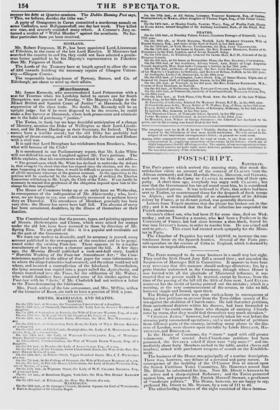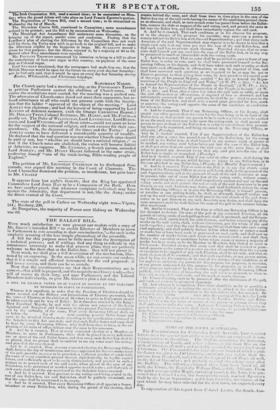The Peers managed to do some business in a small
way last night.. They read the Irish Grand Jury Bill a second time ; and amended the Suspension of Marriages Bill in Committee. It appears to have been very necessary that this measure should undergo alteration ; for, by a gross blunder undetected in the Commons, through whose House it was hurried with all the plenitude of Ministerial influence, it was enacted that no person could be married, except by licence, from the time of the passing of the bill till the 30th of June next. Lord ELLEN. BOROUGH has the credit of having pointed out the mistake ; which is a warning, at the very commencement of the session, to take no bill, however simple and formal, upon trust.
The Bishop of LONDON WitS quite cock-a-hoop in consequence of having a few petitions to present from the Tory-ridden county of Es- sex against the abolition of Church-rates. He said that other petitions, from agricultural districts within his diocese, had been forwarded to him ; and " lie could assure those who thought of carrying Church- rates by storm, that they would find themselves very much mistaken." " Cu/limns JAMES," however, had scarcely taken his seat before the storming party commenced operations ; and a vast number of petitions from different parts of the country, including many places in the dio- cese of London, were thrown upon the table by Lords HOLLAND, HA-
THERTON, and BROUGHAM.
In the House of Commons, the " storm " raged with still greater vehemence. After several Anti-Church-rate petitions had been presented, the SPEAKER asked if there were "any more ?" and im- mediately about forty Members rushed to the table, amidst cheers and laughter, armed with parchment weapons of assault on the Establish- ment.
The business of the House was principally of a routine description. There was, however, one debate of a personal and party nature. In consequence of the inability of the O'Connor Don to attend upon the Scotch Fictitious Votes Committee, Mr. HORSMAN moved that Mr. Divett be substituted for him. Now Mr. Divett is known to be an active and a sharp-sighted Reformer ; anti the Tories protested against him, and proposed Mr. Patrick Maxwell Stewart, a gentleman of "moderate politics." The House. however, we are happy to say, preferred Mr. Divett to Mr. Stewart, by a vote of III to 40. The other leading business of the night consisted of these items-. • The Irish Corporation Bill, read .seseeend time; to be committed on Mon- day: when the grand debate will take place on Lord Francis Egerton's motion. The Registration of Voters Bill, read a second time; to be committed on Wednesday the let of March. The Recorders Courts Bill, considered in Committee ; some amendments ordered to be printed ; and the Bill to be recommitted on Wednesday. The Municipal Act Amendment Bill underwent some discussion, on the bringing up of the report, amidst noise and confusion. Finding that the
Lyndhurst plan of electing the Aldermen by the Councillors does not work well for them, the Tories now wish to go back to the original bill, and to make the Aldermen eligible by the burgesses at large. Mr. SCARLETT moved a clause for that purpose; but the House rejected it, by a majority of 93 to 34. Several other Tory amendments were rejected.
Mr. Poutyrr TtroatsoN announced his intention to bring in a bill to allow the manufacture of beet-root sugar in this country, on payment of the same duty as Colonial sugar.
Lord STANLEY mentioned, that the newspapers had made him say, that the British Museum would be open for the future on every week. day but Saturday: now he had only said, that it would be open on every day but Saturday during Easter, Whitsuntide, and Christmas holydays.



























 Previous page
Previous page